I have set up my new blog at Szavanna.co.za – so this is my last post here – it’s been great here at WordPress.com 🙂 but its time to move on and get more independent.
Click to visit Szavanna_blog’s new home.
July 21, 2007
I have set up my new blog at Szavanna.co.za – so this is my last post here – it’s been great here at WordPress.com 🙂 but its time to move on and get more independent.
Click to visit Szavanna_blog’s new home.
July 18, 2007
Peopleized by: Szavanna – Wednesday, 18 July 2007
 |
Growing up in a small town in Nigeria – Loomnie’s thoughts on his childhood and his musical experiences |
Szavanna: Greetings and many thanks for doing this interview. Please say a few words about yourself and/or your blog.
loomnie: I am a Nigerian blogger working in Germany. I discovered blogging a couple of years ago. It started as a sort of personal reflection, but as the audience increased the posts have become sort of modified. These days I blog about places I visit, movies I watch, books I read and music I listed to. There is no theme to the posts, really; I write about whatever catches my fancy.
Szavanna: Since there are more and more posts on music on your blog – (the last one was about a South African band, Freshlyground), in your Blogger profile you say you like Miles Davis, you wrote about Tinariwen, Ali Farka Toure, Bongos Ikwue and others – it shows that you are interested in a wide range of styles. Where does this interest come from – any specific reason for being so open to music from so many countries – any strong musical background that explains these musical choices?
loomnie: I really don’t know where the interest comes from… ok, let me think about it. I grew up as one of four children in a middle-class family in a Nigerian small town. There wasn’t much to do socially apart from being with friends in school and listening to the radio. The public service radio was pretty and most of the Nigerian music I have recently blogged about I listened to on the radio while growing up in the 80s and early 90s. They also played jazz music from artistes like Tico Rico, Louis Armstrong, Earl Klugh etc. Also, my grandfather died sometime in the early 90s so I literally inherited his library. His library was rich so it opened me up to a lot of things. I kind of ‘discovered’ jazz during my university days, but the striking thing was then when I formally discovered it it was because it reminded me of the kind of music I used to listen to growing up. I explored a bit and found other interesting kinds of music that I loved… the lists just kept growing, jazz, latin jazz, blues, soul… the older sounding the better. Now I am tuned to some younger people. Discovered Joss Stone, Jamie Cullum, Renee Olstead a couple of years ago, just about the same time I got acquinted with the music of Ali Farka Toure and Amadou et Miriam Bagayoko… and as you can see on my blog, I am still exploring. I hope I answered your question.
Szavanna: I’d like to ask a few questions about your childhood. I am not sure if you grew up in Lagos or somewhere else – please tell me a bit about the place you grew up in.
loomnie: I already said a bit about the place…. It is a small town, kind of ancient, town. It is in the Yoruba-speaking part of Nigeria. It is not special in any way, just one of those towns that are slow and comfortable. I think that informs why I don’t particularly love big cities
Szavanna: Can you tell me about the role music played when growing up – did you play any instruments, did any specific type music influence you – any musician or style of music and made an impact in any way?
loomnie: My mother belongs to a church whose joint national choir has about the largest orchestra in Nigeria. I attended the church for some time myself. My mother plays the viola, that obscure sister of the violin. My younger brother plays the piano, and I tried learning the flute too… I dropped it after a while, and I still regret it now. It would have been nice to have that right now. Yes, there was some music in my life as a kid growing up. Actually, thanks for asking these questions; they are making me think more about my life as a kid!
Szavanna: Have you ever made instruments (anything to make noise with:)from material that you found at home when you were small and if yes what type of instrument was it (drums, or shakers or a guitar etc.)- or if not – do you remember someone else doing so?
loomnie: No, I don’t think I ever make any instruments as a kid…well, the thing was that anything could be a drum: the tabletop, the wall sometimes, a whole lot of things. But I never made any instruments…
Szavanna: Some time ago West African idol was on TV and we were watching many of the initial auditions which I found quite entertaining for a while since here in South Africa we don’t usually get to see programs from other countries in Africa (sadly). One of the judges was Dede Mabiaku – who (if I know it right) is a Fela student. What do you think about the show and about Dede’s music?
loomnie: I am sorry but I didn’t watch Idol West Africa at all… I was in Europe when it aired.
Szavanna: I have always been interested in finding out more about the life and times of Fela – how did he and his music influence the communities around you while growing up?
loomnie: Fela was great in so many ways. I think that he is the greatest musical export Nigeria ever had. And he deserves every accolade that has ever been showered on him… of course, except the ones that take him to be a deity. When Fela died I was only 17 so he didn’t have much influence on me when he was still alive. His influence came much later. I remembered listening to his music along with the others on the radio when I was growing up, but in my small town things didn’t really get to us. I guess that if I was in Lagos at that time I probably would have more stories to tell. I can tell you stories about Fela but I don’t think I really have any rights or qualifications to do that; there are qualified people who have done that and are still doing it.
| loomnie’s Page | Authors Page: Szavanna |
powered by Peopleized!
July 16, 2007
It’s great when you can “interact” with the artist. You will remember that for the rest of your life.
The following post is a looong one – it is meant to introduce you to some of the reasons behind running our projects – you can also choose to look at the images and videos to get the idea – enjoy 🙂
I will never forget when we decided to go to Kippies one evening and Sipho “Hotstix” welcomed everyone by the door with a big smile and said “Enjoy the evening”. Wouldn’t it be great to have a cup of coffee with your favourite musician and discuss a few issues – or get in touch with him/her in some other way? Should artists be these mysterious beings (celebrities) that can only be seen on TV or a big stage by their audience? Is that actually what the artist want?
Who is the artist?
When I teach mathematics to somebody, he’s already standing at a certain degree of precision, maybe at a very low degree. He couldn’t get higher by the way that I call him idiot when he’s less precise; but I have to convince him that it’s worth coming up. Of course it’s worth only if he demands it. However, it doesn’t matter at all if one doesn’t have a demand on it; then we remain where we are…”
Source: Extract from László Kalmár’s letter to Miklós Szabó (Szeged, 19/2/1947) In: Kalmár László: Integrállevél. Matematikai írások, Gondolat, Budapest, 1986.]

The WordPress team says ( and many others ) “Code is Poetry”, my grandfather talked about mathematics as if it was the highest art form ever existed, so for me everyone is an artist (and audience member) a bit (or a lot) like in what they call web 2.0 culture.
Anyone who has a passion for his or her work or hobby and is ready to say that there is no such thing as “perfect”.
.
Interaction
There are many artists – or people in general – that interact with their audience in interesting ways – ways and means that we can also learn from.
They use these skills and tools because they think it is absolutely necessary for their work as an artist since without the input and feedback from their audience they can’t establish whether the message got through or not.
Here are a few artists that have developed their own special way of interacting with their audience. Artists, bloggers that I learn from every day.
Paulo Coelho and the Experimental Witch project…
Paulo Coelho is a great writer – and I love the fact that he finds blogging useful in his work – he also has discussions and Frequently Asked Questions on his blog that helps him get feedback from his audience – which would otherwise be impossible since he has a global audience with fans from all the corners of the world.
His latest project, The Experimental Witch is a new tool that helps him get his fans involved. He says :
Throughout my career as a writer, I’ve met people that trusted me without knowing me well and they have helped me, enabling me to follow my dreams. I’ve been visiting the pages of readers this last year and I’ve seen excellent works by actresses & actors, musicians, directors, etc.
That’s why I thought: why not make a movie together? I would retain the rights of the film based on my latest book The Witch of Portobello while developing this partnership.
Please follow the link to the website to read the Rules and participate to the Project!
Telling the story – Ethelbert’s E-Notes
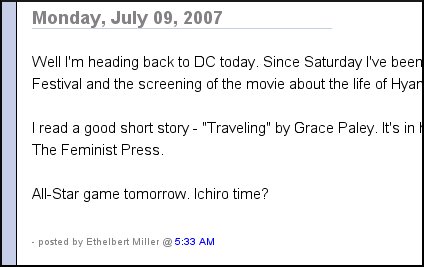
One of the responsibilities of an artist is to report on the world around him/her in a way that is simple and yet entertaining. Like Izz, Ethelbert posts his comments regularly on the day’s issues. He is also a teacher, a lecturer and holds poetry recitals – which helps him interact with his readers on a daily basis.
I met Ethelbert about 15 years ago – when I walked into the library at Howard University. He was very kind and was ready to answer all my questions and went out of his way to find interesting classes to attend during my short visit to Washington DC. I didn’t know then that he was a wellknown poet and a lecturer, quite a celebrity known worldwide. He has been blogging since early 2004 with daily posts in which he lets his readers and students find out about literary events, theater shows, concerts, interesting lectures, the poem he just wrote, the friend he just met – he also comments often on the current political situation, and anything else that he finds worth mentioning for some reason.
Click to visit his E-Notes and see how he tells the story of his Unviersity, his town, his community and more …
How Gilberto Gil and Vieux Farka Toure and many others take part in a new remix culture
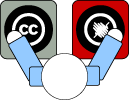 When it comes to music and especially jazz – each pieace is based on the piece played seconds before – each musician gets to be the performer as well as the audience in a very direct way. There is no time to ask permission – “can I please take this and add a bit of that to it” – instead this becomes the rule – building on each other’s work – and nobody gets upset.
When it comes to music and especially jazz – each pieace is based on the piece played seconds before – each musician gets to be the performer as well as the audience in a very direct way. There is no time to ask permission – “can I please take this and add a bit of that to it” – instead this becomes the rule – building on each other’s work – and nobody gets upset.
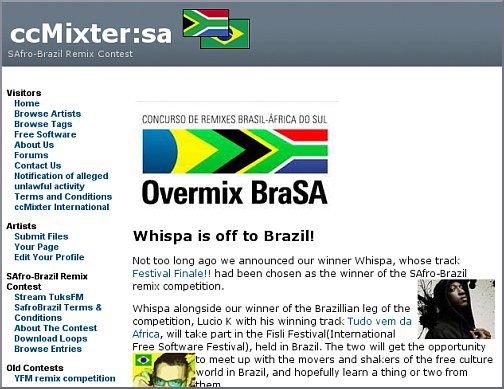
Gilberto Gil, Vieux Farka Toure, Peter Gabriel, DJ Fresh, Zap Mama and many others use the ccMixter as a tool to let their fans remix and build on their music – they set up “remix competitions” in which they make one or some of their songs available online in “raw form”, you can download acapellas, and other audio elements seperately and remix it with your own music. Once the remix is ready – you can re-upload it back to take part in the competition.
From ccMixter.org :
This is a community music site featuring remixes licensed under Creative Commons, where you can listen to, sample, mash-up, or interact with music in whatever way you want.
Remixers If you’re into sampling, remixing and mash-ups grab the sample packs and a cappellas for download and you can upload your version back into ccMixter, for others to enjoy and re-sample. All legal.
Podcasters, directors and music lovers If you’re into music, browse this site to hear some of the great remixes people have built from sampling music on this site, all licensed for use under Creative Commons license.
The Wired CD
These musicians are saying that true creativity needs to be open, fluid, and alive. When it comes to copyright, they are pro-choice. Here are 16 songs that encourage people to play with their tunes, not just play them.
— WIRED magazine, November 2004 issue (CD was included with magazine.)
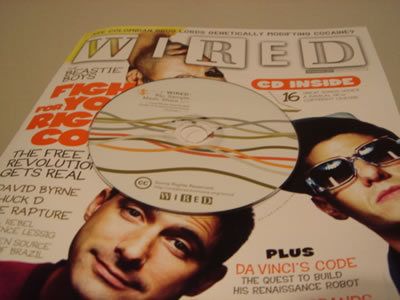
The Wired CD is an album that was released in 2004 as a collaborative effort between Wired magazine, Creative Commons, and sixteen musicians and groups. The Wired CD was distributed inside the front cover of the November 2004 issue of Wired, which also featured a variety of interviews and bios of the performers. Unusually, the songs were released under one of two Creative Commons Licenses, permitting sampling and file-sharing of the songs. (Read more)
Maria’s blog – blogging the process

Eversince I “met” her in cyberspace her warm and friendly attitude towards her readers has amazed me.
She finds so many different ways to share her experiences while working on her play, Baaahhh!!! – the blog tells the story, she also adds YouTube videos and slideshows – actually she promised to work on setting up a Yahoo messenger version of the play 🙂 (Ok this was not serious…. or …. is it?)
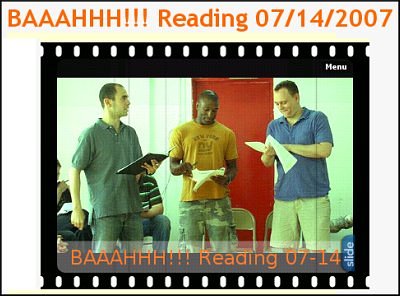
Click to see Maria’s blog and the slideshow about the reading on July 14th.
Using open licenses
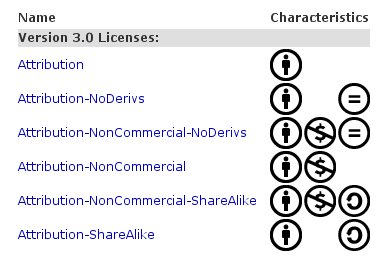
As opposed to copyright – open licenses (like Creative Commons licenses) consider also what the audience would like – not only what the audience “mustn’t do”.
Creative Commons provides free tools that let authors, scientists, artists, and educators easily mark their creative work with the freedoms they want it to carry. You can use CC to change your copyright terms from “All Rights Reserved” to “Some Rights Reserved.” (From the CC site)
A video Presentation about Creative Commons Licencing
As I see there are many bloggers around here that have a CC badge on their sites including Kanute, Izz, Steve, and even Steve ….amongst others….
 At ArtMarketOnline we also experiment with open licenses, one of our artists, Makh has recently published his first book using such a license :
At ArtMarketOnline we also experiment with open licenses, one of our artists, Makh has recently published his first book using such a license :
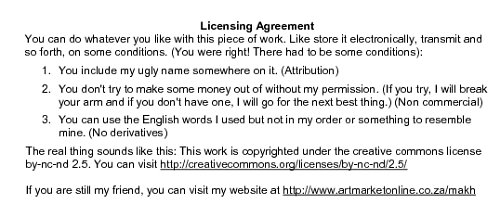
Monday9amTV – a film guy who becomes the audience for each film he makes
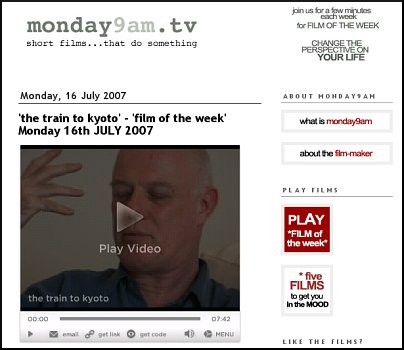
Nic is a special storyteller & blogger – he says it with short films – which are 5-6 minute interviews with people – he makes his films available free on his blog as well as YouTube:
“The films feature characters as varied as rock stars to the homeless, philosophers to the dying, and free spirits to those who fell in love. ” (from his blog site)
“The films appear to capture people ‘unplugged & naked’ and to provoke an exploration of what it means to be truly alive. They are a quietly provocative & a personally engaging study of the extraordinary hidden in the ordinary. ” (says the same About page)
It seems that for Nic – his audience is his paint brush and actually he becomes the audience every time he makes a new film. When it comes to the interaction with the audience – it feels as if his film project was based on the fact that he is “just an ordinary guy” who is “determined not to miss the experience of his own life” – and so he looks for different people and asks them a few questions in order to figure out what not to miss…- and then he lets the people take over. Click here to see his films on YouTube.
Me – by Nic Askew
There are infinite examples – these are just a few – I hope the message got through:)
… So what I actually mean to say with all of this – I think it is essential to notice that the audience is always there (be it one person or many) and it’s up to all of us to find our unique way to make them part of the performance …
July 15, 2007

July 14, 2007
When it comes to Web 2.0 tools – everyone gets to be on both sides – all of us can read and all of us can write the posts, listen to music or upload your own compositions, buy a book or publish one. You are also encouraged to do all the above together with others running similar projects – you are encouraged to collaborate within your communities. “Conversational knowledge sharing” – says Steve. Things work quite differently these days on the NET and a very good example of these concepts is the Wikipedia. Carte-Blanche recently did a story on it and I thought this video might be interesting for all those that have been wondering how it started and how it is being maintained.
Click to see the video on Zoopy.com
So who are all those people that are writing the articles on Wikipedia? One great example of a Wikipedian is Ndesanjo, Tanzanian blogger, who is the main contributor to the Swahili Wikipedia – (http://sw.wikipedia.org/).
Swahili, which is thought to be spoken by as many as 100 million people, is the first African-language Wikipedia to have reached the 1,000-article mark — considered something of a tipping point toward faster growth in the Wikipedia world. ( Read Noam Cohen’s article on Ndesanjo and African-language Wikipedias )
To get to know more about Ndesanjo’work, his blogs Jikomboe and Digital Africa here is Dara‘s video :
Patrick Tutwiler interviews blogger & wikipedian – Ndesanjo Macha
(Thanks Dara! – If you are up for it – please write about the making of this video – it’d be interesting to hear about the reasons for choosing Ndesanjo, and whether there is gonna be a follow-up video with him in the future. Looking forward to new videos & interviews from you on YouTube.)
July 11, 2007
Probably he needs no introduction to most of those reading this – still I hope this post provides you with a little extra about the storyteller of Izzonline 🙂
GOB!G on life – an intro to Izzonline
Peopleized by: Szavanna – Tuesday, 10 July 2007
 |
Izz on storytellers, asking the right questions – he also writes about his plans with his blog Izzonline. |
Thanks so much for making the time to answer my questions. Please introduce us to Izz by using a few one-word adjectives and nouns
izzonline: Still honestly don’t know the difference between adjective, noun and verb. But let my try:
Willing,
Determinant,
Father,
Hubby,
Writer,
Rebel,
Soloist
Szavanna: What search terms & keywords do people use to find your blog?
“from content with little comes happiness”
Robin Sharma,
Greatness guide,
Mxit naked pictures,
Inspiration,
Izzonline,
Israel Mlambo,
Best life,
Szavanna: You say in your blog you are a storyteller – please tell us about the responsibilities of a modern day storyteller?
izzonline: Storytelling today is, to me, unlike in the latter days. Today you need to be able to entice your reader and to offer not only truth, but entertaining truth. The reader of today doesn’t go a day without consuming junk – be it in writing or edibles, so the storytelling has to, without being too superflous, skate on thin line to cater for that too. Unlike telling attractive urban legends, one needs to weave together believable magic with enough mystery – the human culture is still seduced very much by mystery. In short, in the modern day, storytelling supercedes telling a story. It’s about taking a reader for an experience because we have to remeber, today’s nation hates reading any sentence longer than five words.
Szavanna: Something tells me that you have some B!G plans with your blog – please tell us a bit about the reasons for setting up your blog and writing those posts one after the other?
izzonline: The sub-B!G plan is to make the izzonline.co.za (soon to be) the #1 blog in South Africa. And I think by mid next year this goal will have been more than achieved.
I set it up, initially, to hold myself to practice, daily, a skill that I feel was starting to be taken for granted in my life: writing. In writing, when those words pour out, unforced, my soul opens up. Those words give me a beautiful path to my soul – I’d like to believe.
Since the initial phase of the blog had passed, the reasons for the blogs existence include: maintaining a repository of my thoughts, engaging others in views that I otherwise would have thought were perfect from where I’m standing. The biggest achievement (reason) of my blog though, is, it let me to starting to write a novel (fable in fact): The Half Prince of Timbuktu – A Quest for True Joy, which is, I want to convince myself, going to be one of the worlds international bestsellers (don’t ask me, I think I’m half asleep as I write this).
Szavanna: Do you find the blog format appropriate – how is it working so far to get your message through?
izzonline: The blog platform is just incredible for me. It does what it is supposed to do without the hassle of tech savviness. It has opened doors to many who also wanted to interact, through their writings, on the blogosphere.
The only thing that I still need to clear out though, is when to get personally attached to ones writings and when not to. For me, the vanity that comes with that sometimes may drive away otherwise good readers.
Szavanna: Your posts all end with the Voltaire quote- “Judge of a man by his questions, rather than by his answers.” I also think it is really important to ask questions and also to ask the right ones – what advice would you give “peopleized newbies” like me – what does one have to consider when asking questions?
izzonline: I’ve evolved from using quotes at the end of my posts because I had to increase ways of marketing my blog, meaning that invite unsavvy readers to email the post to friends. But that quote still defines my approach to life. That one must ask questions – curiosity leads to discovery.
My take on it is that one must ask questions not expecting to find perfect fit answered, but rather bits and pieces that may still need to be digested in to an answer. Sometimes we get lucky and get the right answer, but if we expect it, we are more than likely to be dissapointed and that could lead to one asking lesser questions. The lesser the expectation (more curiousity though) the better.
Szavanna: My last question has to be of course : how did you find my questions – did I ask the right ones in order to get the basic picture and meaning behind Izzonline?
izzonline: Your questions also helped rethink what izzonline stands for. Almost like you were forcing me to look at my own product with a magnifying glass. And from that, I benefitted as well. GOB!G on Life.
| izzonline’s Page | Authors Page: Szavanna |
powered by Peopleized!
Izz – thanks so much for the answers – and thanks again for the posts – I have already learned so much from all the info, thoughts and quotes at Izzonline – best wishes with your plans and looking forward to getting a copy of your fable once published!
July 11, 2007
“… here we are, with our problems, but also with the freedom to talk about them”(Paulo Coelho).
Today I was busy reading the Coelho blog again – lots to learn there – I see that both Izz and Fasy are big fans as well – I think even Maria mentioned that she likes Coelho’s work- and the great thing is – he likes to blog which makes him easily accessible by a global audience which I think is great if you are a writer.
Yesterday’s “Today’s question by Aart Hilal“:
Hasn’t it been difficult for you to stay in Brasil after all the harm the Brasilian dictatorship has done to you in former times? What made you stay there although you have been imprisonned under very cruel circumstances from your own people?
Paulo Coelho : It was impossible to live in Brazil, because after being in jail, you develop a kind of paranoia, you think that everybody is following you, listening to your conversations, etc. So, after being released, I went to London, but after three or four months, I realized that this was to scape to reality, to be a “strange in a strange land”for the rest of my life. So I decided to face my fears, and I returned to Brasil. It was better to die here than the be a living dead in a foreign place – I made this choice.
As for the second part of your question: I was not imprisioned by my own people, I was imprisioned by the military junta, that kept my people silent under the threat of weapons. My people was waiting, because there is no arguments against force. On the other hand, nobody can keep the pressure forever, so at the long run Freedom won, and here we are, with our problems, but also with the freedom to talk about them.
July 10, 2007
Je suis le fils de la terre maternelle
Je suis l’enfant des douleurs éternelles
Je ne suis pas le seigneur du désert
Mais l’esclave des horizons nus
I am the son of the maternal ground
I am the child of eternal pain
I am not the lord of the desert
But the slave of naked horizons
From the poem ‘Pas de Nom’ (‘No Name’) by Issa Rhossey, a Touareg poet from the Aïr region. The poem is published in ‘Tourne-tête, le pays déchiqueté’, a collection of modern Touareg poetry edited by Hélène Claudot-Hawad and Hawad, and published by Éditions Amara. This extract is translated from French by Andy Morgan.
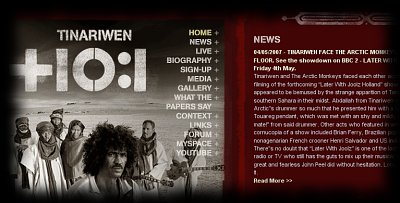
From the website’s About page (though I am not sure who wrote this text…) :
When the time came, I ducked under the red leather animal hide covers of a traditional Touareg tent and sat myself down gingerly on a sandy technicolor floor mat. The cool and dark space was filled by about seven men, sitting, lounging, cross-legged, squatting, unperturbed, relaxed and minimalist in their movements. Some were turbanned, others were not. There was Hassan aka Abin Abin aka the Lion of the Desert, Mohammed aka Japonais, Abdallah aka Catastrophe, Ibrahim aka Abaraybone, Kheddou and other extended members of the crew like Sweiloum, Diarra and Bigga. They sat immobile like resting fighters, neither aggressive nor overly friendly. Their calmness and lack of excess… excess talk, excess movement, excess belongings, excess emotion… flustered me. A tea was being prepared with unforced ritual. Tea drinking in the Sahara is emblematic of hospitality, friendship and the slow baked pace of things. I set up my DAT nervously and then asked the dumbest but most obvious question available to the unprepared journalist, “How did it all begin?” Long pause. Mild panic. Tinariwen remained ice cool. Eventually Japonnais began to answer the question in minuscule chunks of guttural and heavily accented French, each punctuated with the phrase “Est ce que tu vois ça?” or “do you get me?”, which sounded more like ‘Iskitiwassa?” Those bafflingly oriental facial features, which are the source of his nickname, remained sharp and penetrating, Shogun-like, throughout. Then after about a minute he motioned me to switch off my DAT machine and proceeded to confer with his brothers-in-arms, in Tamashek, the Touareg language. A full-blown debate started to brew. There seemed to be disagreements about dates, times, names and places. Fifteen minutes later the discussion was still raging, and I was still sitting there, largely ignored, with my inactive DAT machine in front of me. It was almost comical. ( Click to read more …)
Tinariwen & Carlos Santana : Amassakoul
July 8, 2007
I was busy browsing Izzonline and found this a quote by the Dalai Lama.
It’s a time when there is much in the window
But nothing in the room. (His Holiness the 14th Dalai Lama.)
Read the complete quote here.
July 6, 2007
This is a topic that fascinates me – since the very first time I sent that e-mail I was amazed by the power of the Internet and I really enjoy exploring web 2.0 tools.
I fully believe that there are major problems with today’s educational system – I don’t think we learn the right things at school – (to see this we only need to look at today’s world and all the problems we encounter and cause on a daily basis) – I always beleived that knowledge and skills must be freely shared from person to person ( it used to be the case in the old days – it’s actually nothing new ) and that is what I try to do on a daily basis in the OpenCafe.
I don’t have any qualifications when it comes to IT – I learn everything I know from manuals, mailing lists, websites that I find on the NET – similarly to all others in the open source world – the knowledge I have picked up so far enables me to run an Internet cafe, create websites, write books, run workshops – in other words all the skills I learn (for free) I use daily in my work – and I see a lot of potential in the new tools I see appear on the web almost daily to help me learn in an even more efficient way and also help me apply my new knowledge using web 2.0 tools.
Steve’s blog, How To Split An Atom explores web 2.0 concepts – it’s a new world – and his blog will help you get to survive in it.

Steven on web 2.0
Peopleized by: Szavanna – Friday, 06 July 2007
 |
All about the meaning behind web 2.0 and exploring the concept of a \”2.0 culture\” in which we translate web 2.0 concepts into offline tools for those without Internet and computer access. |
Szavanna: Thanks for agreeing to answer these questions and many greetings from the OpenCafe. Please introduce yourself in a few words and tell about the reasons for choosing to write about web 2.0 related topics.
sbspalding: My name is Steve Spalding, I am an Engineer, blogger (How To Split An Atom), entrepreneur and web enthusiast. I choose to write about Web 2.0 because I believe the idea of the “social web” and the communities that have been created around this idea is fertile ground for all the next, big disruptive forces in technology.
Szavanna: You say your blog is about “Web 2.0 culture, and how to survive in it” – it does sound like there are some challenges to overcome in this new online world – what are some of these?
sbspalding: The short list are these: information overload, loss of identity, management of reputation, and privacy to name a few.
For every new innovation there are associated challenges. Web 2.0 is no different.
Szavanna: Web 1.0, web 2.0, web 3.0 – how would you say the web evolved over time and where is it heading? (If you can describe in a few sentences.)
sbspalding: Absolutely.
Web 1.0 was the static web, in this web we were fed information and we consumed it.
Web 2.0 is the community web. Now, information is all a part of a conversation. We have social networks, blogs and wikis that allow is to interact with knowledge.
Web 3.0 will be the semantic web. When we have orders of magnitude more knowledge than any one person could ever hope to deal with, we’ll need ways to parse it down into manageable chunks. Web 3.0 will answer these questions. Once a week or so I blog about this over at How To Split An Atom.
Szavanna: What role widgets play in today’s Internet – what are some of the best uses for widgets?
sbspalding: Widgets help simplify and codify the web. They allow is to easily import information from various “islands” in our web empires. As we continue to participate in larger and larger numbers of web services, widgets will be the technology that enables to pull all of the information we produce back into a central location.
Szavanna: There seems to be a big gap between social networking online and offline – do the two worlds ever meet?
sbspalding: More and more. People are selling real, physical property on Facebook and Craig’s List. In Second Life, real money transactions occur daily, on business cards many people are starting to include their personal websites and blogs.
Our digital lives and our “real” lives are becoming more intertwined on an almost daily basis.
Szavanna: I have always been interested in finding ways of “translating” web 2.0 concepts to just “2.0 culture” what would be possible ways of broadening this new trend and include everyone in it – be it Internet user or someone without computer and Internet access?
sbspalding: 2.0 culture. That’s an interesting concept, one that I agree with. The idea is simple, “2.0” is conversational knowledge sharing.
I know something, whether it is a broad topic or a narrow niche and I make my knowledge easily available to those around me. Basically, “2.0” thinking is evangelizing for the long tail.
Instead of thinking of knowledge in terms of broad subject we think more in terms of narrow niches, and we focus our energy on spreading that knowledge as efficiently as possible.
Szavanna: OpenCafe’s approach – kind of a web 2.0 for everyone – an open source Internet cafe that offers and supports the creation and sharing of open source software/open content support, free skill exchange, international audience both offline and online – we are a kind of “offline widget” 🙂 – taking online content making it available in an offline non-profit setup ( via our Freedom Toaster and other tools ) with a strong educational focus – any thoughts/suggestions for our project – can such a project become a global trend and contribute to new ways of teaching, learning and interacting?
sbspalding: I think it’s a fantastic idea mate, one I would be more than happy to explore on my blog if you are willing to sit down for an interview yourself? Thanks for the opportunity.
| sbspalding’s Page | Authors Page: Szavanna |
powered by Peopleized!
Steve thanks for the interview – so much to learn – so I will be exploring your blog further – in order to gather questions for future interviews on this topic.